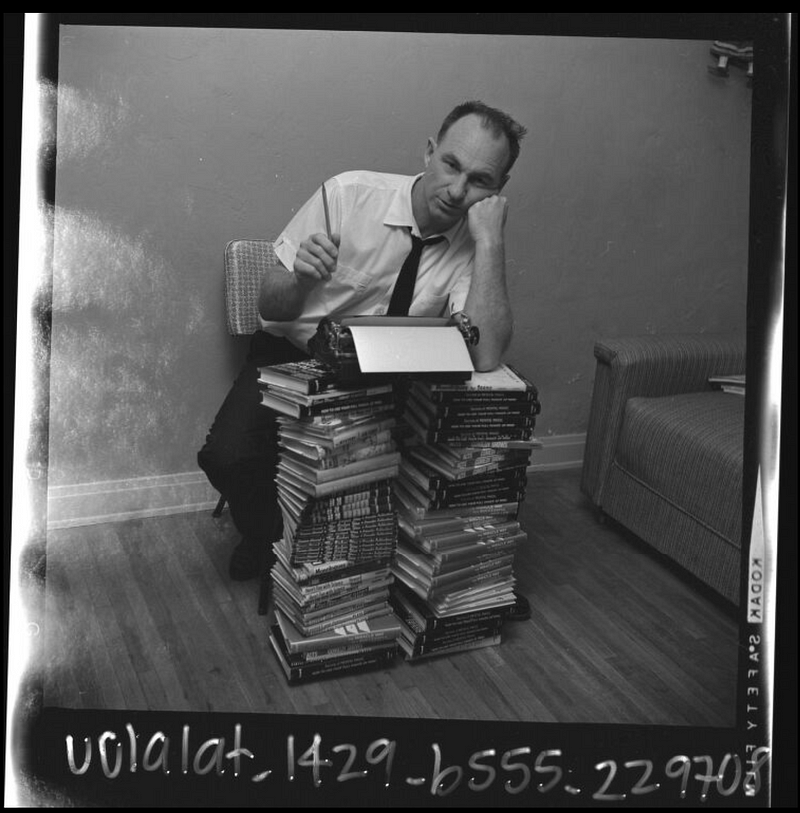Vernon Howard: The Unheralded Metaphysical Philosopher
Written on
Chapter 1: The Rise of a Unique Spiritual Thinker
In the mid-20th century, the landscape of spiritual teachings was often muddied by prosperity ministries and over-the-top motivational seminars, leaving a significant gap between the true essence of metaphysics and the watered-down versions that permeated popular culture. Yet, amidst this chaos, there emerged a spiritual philosopher who skillfully navigated these treacherous waters: Vernon Howard.
Howard, who lived from 1918 to 1992, began his career aligned with the success gospel, only to later break free from its grasp. Leaving behind the ethical and material complications tied to commercialized spirituality, he forged a new understanding of mind power. Although he was not widely celebrated, Howard had a unique talent for simplifying the intricate philosophies of various religions into straightforward, actionable insights.
Born in Haverhill, Massachusetts, and later relocating to California, Howard’s voice stood out in America’s practical spirituality scene. His initial writings, spanning from the late 1940s to the early 1960s, could easily be mistaken for standard New Thought literature, featuring titles like Success Through the Magic of Personal Power and Word Power: Talk Your Way to Life Leadership.
Howard’s work extended beyond spiritual texts to include trivia and children’s literature, but by the mid-1960s, his perspective shifted dramatically. This change stemmed from his desire to escape the emotional rollercoaster often experienced by ambitious writers. He reflected in a 1978 interview with the Los Angeles Times:
"I started realizing the uselessness of the extraneous. People could tell me I was a good writer and I realized all it did was make me hungry for more applause..."
He ultimately stepped away from his career in success literature, as well as from his marriage, relocating to Boulder City, Nevada—a place far removed from the spotlight of literary fame.
Howard’s new life allowed him to evolve into a distinct spiritual voice. Between the late 1960s and his passing in 1992, he produced a diverse array of pamphlets, parables, articles, and lectures, emphasizing the importance of transcending temporary external rewards for a more genuine inner existence.
In essence, Howard’s teachings resonate with the biblical tale of Jacob and Esau, illustrating how we often trade our deeper truths for fleeting pleasures. He urged his audience to recognize this pattern in their own lives, advocating for a shift away from worldly achievements toward a state of genuine contentment.
Howard’s philosophy revolved around two central concepts:
- Humanity is driven by a false self that seeks approval and validation through external means, ultimately leading to dissatisfaction.
- Genuine happiness comes from shedding this false self and embracing one’s True Nature, which he described as emanating from a Higher Will or God.
This perspective highlighted the often negative behaviors of those around us. Howard was unyielding in his assertion that recognizing the manipulations of others is not pessimistic but rather a form of intelligent self-protection. He encouraged individuals to distance themselves from those who diminish them, emphasizing that once we see through the negativity, we can attract healthier relationships.

Chapter 2: The Clarity of Howard's Teachings
Howard's directness often felt refreshing, as seen in an interview with writer Guy Findley:
G: What is real power? VH: The absence of your false power...
He illustrated human distraction, comparing it to a child's fleeting focus on toys, revealing how easily adults too are sidetracked by superficial gains.
Despite attracting a modest circle of about fifty students in Boulder City, Howard maintained that the size of his audience was irrelevant to the truth he sought to convey. He famously stated, “We send our message out but we have no concern for the results.”
His teachings reached a broader audience through videotaped lectures that circulated on public-access cable television, alongside a robust catalog of books and tapes.
The first video titled "Dr. Peter Kreeft - 10 Influential Philosophers and Why You Should Know What They Said" offers insights into the philosophical landscape that influenced thinkers like Howard.
As Howard continued to share his teachings, he appeared approachable—dressed casually, embodying an ordinary persona with an extraordinary message about inner freedom. He maintained that true liberation awaited anyone willing to turn inward and question the allure of external rewards.
The second video, "Graham Priest: The Metaphysics of Nothingness," delves into themes that resonate with Howard's exploration of existence and self-awareness.
Howard’s writings were often sensationalized, with titles such as The Mystic Path to Cosmic Power and Secrets for Higher Success. This approach, while potentially limiting his audience, reflected his intent to reach people seeking genuine help.
His philosophy emphasized practical applications for everyday life, insisting that self-development should tangibly enhance our daily experiences. Moreover, he addressed the issue of human cruelty, asserting that many spiritual thinkers fail to grasp its pervasive nature.
Howard taught that separating from harmful individuals is crucial, not for confrontation but for self-preservation. He noted that the manipulative often disguise their actions and cautioned against engaging with them, promoting an understanding of one's own worth and boundaries.
As he provocatively stated:
"Show me the victim and I’ll show you the bully."
Howard’s teachings provide valuable aphorisms that challenge readers to reflect on their beliefs and behaviors.
In summary, Vernon Howard’s life and work serve as a profound reminder of the importance of inner truth and self-awareness in a world filled with distractions and superficial pursuits.